| right
and below: Plac Wolnosci - 3 May 1946 (today this place is called "Eisenhower-Place") |
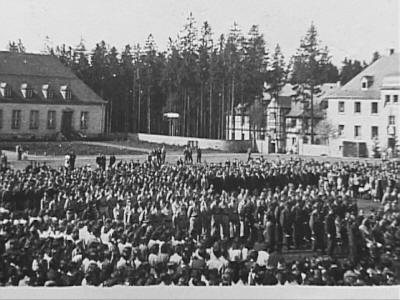 |
|
Michael Adamski is a survivor. Here's his story: |
|
I was born Sept.1928 in Wozniki-Sieradz, Poland, where my parents owned a house, some land for orchard garden and small grocery store and where I attended school. With Nazi Germany and Soviet Russia conquest of Poland in September 1939 and occupation of our part of Poland by German army and consequent annexation of our part of Poland to German Reich suddenly in beginning of November 1939 my school in Sieradz and all the schools in the entire area of Western Poland annexed to the Reich (Germany) were locked up by German authorities, most of our teachers arrested and we were told that there will be no more schools to Poles. So my primary education formally ended at 5th grade. About 2 years later in April 5th 1942 few days before Easter at 5 o'clock in the morning a loud banging to the door woke us up and a couple uniformed German soldiers and a Polish translator informed my parents that we all are to pack up and in one hour be ready for commission for work in Germany to be held on grounds of previously deported our neighbor Mr. Fitce just across street from our home. When accompanied by a German policemen with our suitcases in hands one hour later we on foot we arrived at designated area, the place was crowded with people similarly apprehended as us and the commission composed of a few uniformed SS-men looked into our eyes, checked our noses and declared my family, that is my father, mother, me, 13 years old at that time, two my older sisters and most of our neighbors assembled there fit for labor in Germany. Locked in empty factory building and kept under police guards a week later we were all transported by train to some transition camp around Magdeburg in Germany and eventually distributed to different slave labor camps and farmers in the area. My Family destination was Radicke's large farm in Sangerhausen, near Halle. Where we were given two small rooms in the attic over cow house and some gruel and bread and became that farmer' slave laborers. That spring and summer he kept us all busy working six and sometimes seven days a week mostly in the fields for nothing. The following winter my father and I were sent to forest camp in Hartz Mountains about 20 km distant from Sangerhusen to work as tree cutters or lumberjacks while my mother and two sisters were permitted to stay on the farm doing some odd jobs inside. . After about 3 months work in the forest in early spring 1943, we both extremely starved returned back to the Radicke's farm. For the next winter 1943-44 instead to forest tree cutting my father and I were sent to work in small machine factory ' Rudolph Machine Werke ' on the outskirts of Sangerhausen and with about twenty other foreign , mostly Polish slave workers we were lodged in some vacant building belonging to near by brick plant during the war not active. After that winter we both did not returned to Radicke's farm, but were told to keep working in the factory and we stayed there till the liberation by American forces in April 1945. Freed from our German masters we were advised by the Polish Liaison Officer representing Polish in-Exile Government in London entering Sangerhausen with the American forces to move to newly set up camp for Polish people established in former quarters of French war prisoners who earlier departed for their homes in France. Afraid to return to our homes in Poland on account of Communist Russian new occupation of our country, we stayed in this new camp in great moral distress for about 2 months not knowing what to do or what going to happen with us. Finally by the same Polish Liaison Officer we were informed that it has been agreed among our Allies that these Eastern territories of Germany were our present camp was located were to be given up by Americans for occupation by Soviet Red Army. However, he assured us that it has been agreed not to left us behind and all Polish people who do not wish to return to communist Poland will be provided transportation to move us to new camp in Bavaria so we may stay in American Zone of occupation. Despite wild rumors flying that like our country we shall be all abandoned to Soviets, in due course a cattle train for us all was provided and after a day journey to Bruckenau we transferred to military open trucks and were taken Wildflecken DP camp. In that summer 1945 when we arrived there, this huge former German military base must hold over 30 thousand people of many Eastern European nationalities and the crowding, food and disorder were terrible. However after a month or two all the other nationalities were evacuated somewhere else and in Wildflecken remained about 17 to 18 thousand Polish citizens. Also in about the same time our food changed from old German supplies into much better American, delivered by UNRRA. And thanks to more sympathetic American UNRRA director and a new Polish local administration several schools opened and strong Polish Scouts movement for the young became organized, Variety shows and plays were performed by "Stara Banda" a group of actors from Warsaw and life in the camp generally improved. Off course with most people with too much time on their hands and waiting for some miracle to return to free Poland and with little to do meantime, some caused trouble theorizing near by German villages in vendetta for their old grievances and persecutions received in Nazi times. But there were also in the camp some outstanding Polish individuals ( presently I can name only of Mr. Janta , who later emigrated to U.S.) who with some others similarly responsible persons in camp worked very hard to curtail such behavior and abuses and tried to bring as much as possible purpose and order to our lives there. Here I enclose several pictures from parades and the celebration of Polish national holidays in Wildflecken in 1946-7: |
| right
and below: Plac Wolnosci - 3 May 1946 (today this place is called "Eisenhower-Place") |
 |
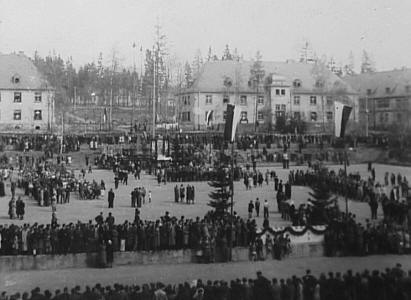 |
|
|
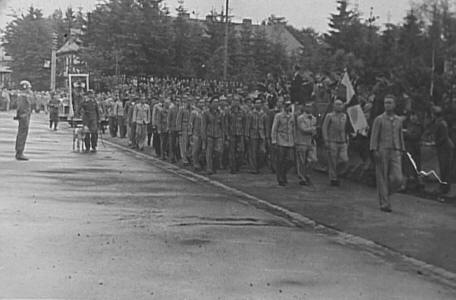 |
Parade of Men from Conc. camps on American memorial day -1946 |
|
Group
of polish scouts. One of them is Michael Adamski. |
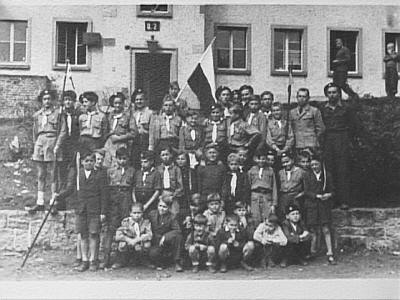 |
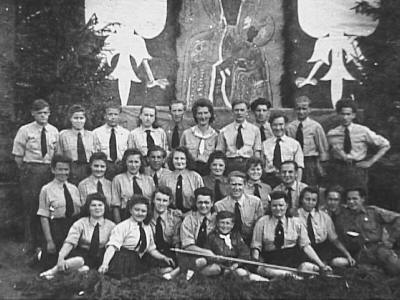 |
|
|
||
| top
of page/ nach oben |
© by Heinz Leitsch |
|